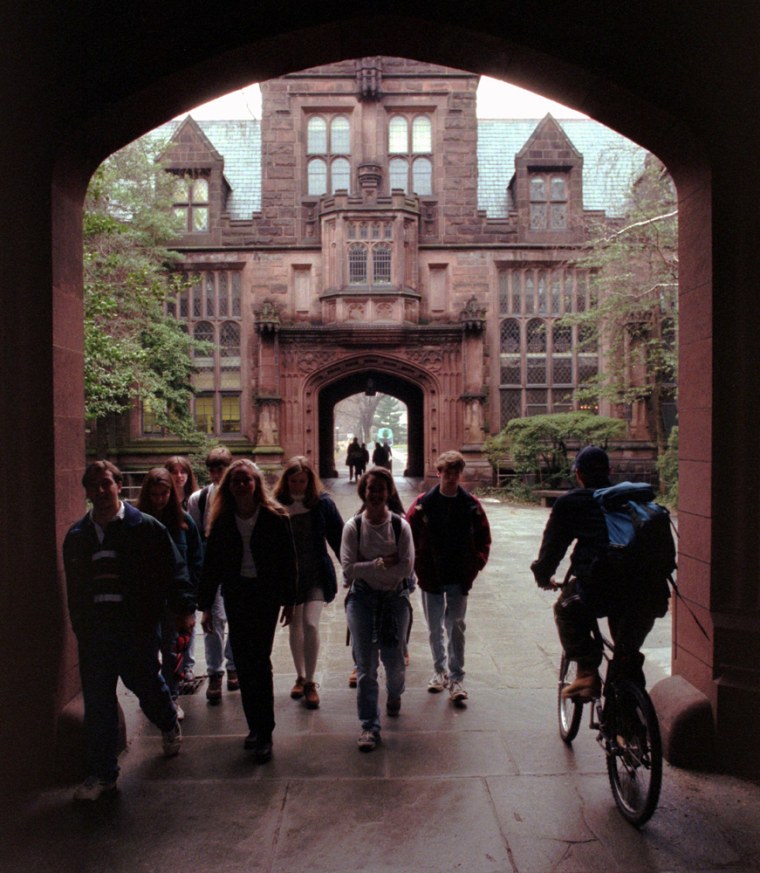Colleges around the country are closely watching for a key ruling in a bitter legal battle between Princeton University and a disgruntled alumnus who claims the school misspent the millions his family left the school in 1961.
Regardless of the outcome, the case has already cost Princeton $22 million in legal fees and left a mark across higher education. Many colleges are grateful they haven’t been targeted by such a suit — and newly determined to make sure they never are. It’s accelerated a trend among both schools and donors of negotiating upfront just how gift money is to be spent.
“I wouldn’t say it has scared us,” said Martha Dean, executive director of development at Bryn Mawr College in Pennsylvania. But “we certainly have observed it and thought, ’There but for the grace of God. ...”’
At stake for Princeton is access to funds from a supporting foundation now valued at nearly $850 million — a hefty chunk of change even for a school whose $14.8-billion endowment is the largest per student of any major university.
The lawsuit by the family of William Robertson against Princeton has “clearly served as an important wakeup call,” said Robert Lindgren, president of Randolph-Macon College in Virginia and the former head fundraiser at Johns Hopkins University. The concern is more with older gifts that predate the current era when both donors and universities have insisted on spelling things out more precisely.
No more handshake agreements
“A hundred years ago, there were handshakes,” said Kent Alexander, general counsel at Emory University. “Now there are contracts and we’re more litigious. I would worry more about something in the past coming back to bite us.”
The upcoming state court ruling in the Princeton case — on key preliminary issues that could determine which side has an edge if the dispute goes to trial — has prompted reflection on college campuses about the issue of “donor intent.” For colleges, the issue is the fine line they must walk between acting as faithful stewards of their donors’ money and maintaining the authority they need over their own affairs in a changing world.
William Robertson maintains his parents, Charles and Marie Robertson, heirs to the A&P grocery fortune, gave $35 million in stock to Princeton’s Woodrow Wilson School of Public and International Affairs expressly to train to students to work for the U.S. government. He claims Princeton hasn’t lived up to its end of the deal, and he wants to be able spend the foundation’s money elsewhere for its intended purpose.
Princeton argues the Robertson foundation was created to support the mission of the Wilson School, which trains students for U.S. government jobs but also for a range of other policy-related careers. The university also maintains the original agreement with the donor gave Princeton final say over how the money is spent. Princeton says it would set a dangerous precedent if a donor’s heir could rewrite the original terms of a gift.
Typically, donor intent disputes never go this far. Donors and the institutions they give to are almost by definition on good terms, and they usually work it out. If an institution concludes it can no longer fulfill the precise terms of a gift, it can go to court for permission to change them. On some occasions gifts are returned or turned down.
The unusual circumstances at Princeton include not only the big financial stakes but a long, steady build-up of acrimony that has prevented a settlement and made Robertson willing to spend millions suing his alma mater.
Still, trends among both universities and donors suggest other conflicts are likely — no matter how carefully agreements are written.
Colleges seek flexibility
For colleges’ part, the Robertson case has helped hammer home the need for flexibility — particularly if there is a dramatic change in circumstance. After Hurricane Katrina, Tulane University in New Orleans rewrote the language it attaches to gift agreements to give the school somewhat broader latitude.
Tulane found alternative uses for funds underwriting the civil engineering program the university closed, and eventually satisfied all the donors, vice president of external affairs and COO Yvette Jones says. However, it is still fighting a legal battle with supporters of Newcomb College, formerly Tulane’s women’s college, who claim Tulane reneged on its obligations when it folded the college fully into the larger university.
Opponents of the recent decision by Randolph-Macon Women’s College in Virginia — now Randolph College — to go co-educational also have tried to use the principle of donor intent in their so-far unsuccessful legal efforts to get the decision reversed.
Contemporary donors, meanwhile, are showing a much more hands-on interest in the programs that they support than their predecessors. They are increasingly focused on results and outcomes, and want to stay engaged. Universities will have to accommodate the trend to attract donations.
There will also be new pressure from a group that will be formally announced later this month called the Center for Excellence in Higher Education. The group, whose supporters include the conservative John W. Pope Foundation, will work with donors to hold universities more accountable for how they spend gifts. Its projects include developing financial mechanisms that would give donors more say — for instance by making regular, conditional donations rather than forking over large sums up front.
“When the cat’s away the mice will play,” said Frederic Fransen, the new center’s executive director. “For too long nobody has been watching to see that universities are the best possible stewards for (donors’) resources.”
